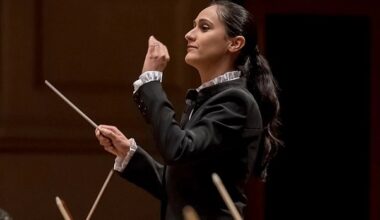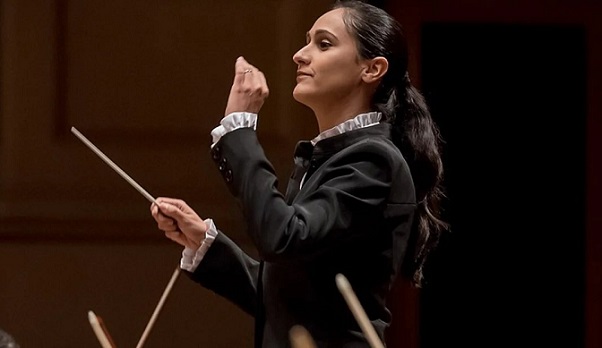 United Kingdom Saariaho, Ravel, Mendelssohn: Denis Kozhukhin (piano), BBC Scottish Symphony Orchestra / Simone Menezes (conductor). Usher Hall, Edinburgh, 14.5.2023. (SRT)
United Kingdom Saariaho, Ravel, Mendelssohn: Denis Kozhukhin (piano), BBC Scottish Symphony Orchestra / Simone Menezes (conductor). Usher Hall, Edinburgh, 14.5.2023. (SRT)

Saariaho – Lanterna magica
Ravel – Piano Concerto in G major
Mendelssohn – Symphony No.3 in A minor, ‘Scottish’
For obvious reasons, all of Scotland’s orchestras have to know their way pretty comfortably around Mendelssohn’s Scottish Symphony. It is more for their touring audiences than their domestic ones (there are only so many times a Scottish audience will put up with it in any given time span), but I still have to admit that familiarity means I rarely get excited when I see it on a concert programme.
This performance was a cracker, though. The BBC Scottish Symphony Orchestra made it sound like it was their in-house party piece, with terrific orchestral tone, marvellous sectional sounds, and a convincing overall vision. The slow introduction was dusky and atmospheric, but there was a real kick of energy when the main Allegro un poco agitato got going, and its tutti section was the most exciting sound of this whole concert. After a feather-light Vivace non troppo and a quietly poignant Adagio, the drama of the finale was led by a string section that was firing on all cylinders. The quintet of horns sounded superb in the coda, but the overall blend was terrific, and I will long remember the liquid beauty of the cello sound as the first movement’s development gave way to its recapitulation.
However, there was also a very clear sense of where the music was going, and that was down to the conductor Simone Menezes. She shaped the music with a real sense that she knew where it was going, and she controlled the overall sound picture with confidence and insight. She did her best to do the same with Kaija Saariaho’s Lanterna magica, despite its often-forbidding soundscape. Saariaho’s piece was inspired the machines that produced the first moving images, and mostly revolves around musical motives being used at varying speeds. In fact, there is a sense of steadily building perpetuum mobile to the piece, like a rotating device building up speed, and Saariaho uses the orchestra’s textures with remarkable inventiveness, including various tuned percussion and even, at one point, a rain stick. It is a slow-moving musical collage with chords that often seem as though they are melting on the page in front of us, with even some eerie whispering from the orchestral musicians. It’s a difficult piece to love, though, not least because of its doom-laden tone. It is inspired by Ingmar Bergman’s autobiography, but it feels like it is written in dread rather than celebration. My experience of Saariaho’s music is admittedly limited, but hers rarely strikes me as an upbeat musical world: it is more like there is doom crouching around the corner and we need to beware of its approach. Nothing wrong with that, per se, but it can be an exhausting emotional experience to encounter!
Ravel’s G major Piano Concerto is much more welcoming, on the other hand. Menezes drew out the piece’s sharp edges in the glittering outer movements but found something more long-breathed and relaxed for the heavenly slow movement. In that, pianist Denis Kozhukhin was also on great form. He is a semi-regular guest with the BBC SSO, mostly in more gnarly repertoire than this, but he took to Ravel’s jazzy high jinks like a duck to water. He understood the playfulness of the outer movements, but he was never less than completely focused on what he was doing. At times it appeared, in fact, as though he was lost in his own world of stillness while the orchestral sound swirled around him. He could conjure up some rhapsodic playfulness for the faster sections, but he approached the Adagio assai with unashamed Romanticism, letting the slow movement play out like a blissful improvisation. The orchestral solos, by the way, were first rate, with a lovely horn in the Allegramente first movement and, of course, cor anglais in the second; but harpist Helen Thomson deserves a special shout out for her first movement solo, which managed to combine pointillist precision with an impossibly smooth legato.
The Glasgow performance is available on BBC Sounds (click here) until 10th June.
Simon Thompson
